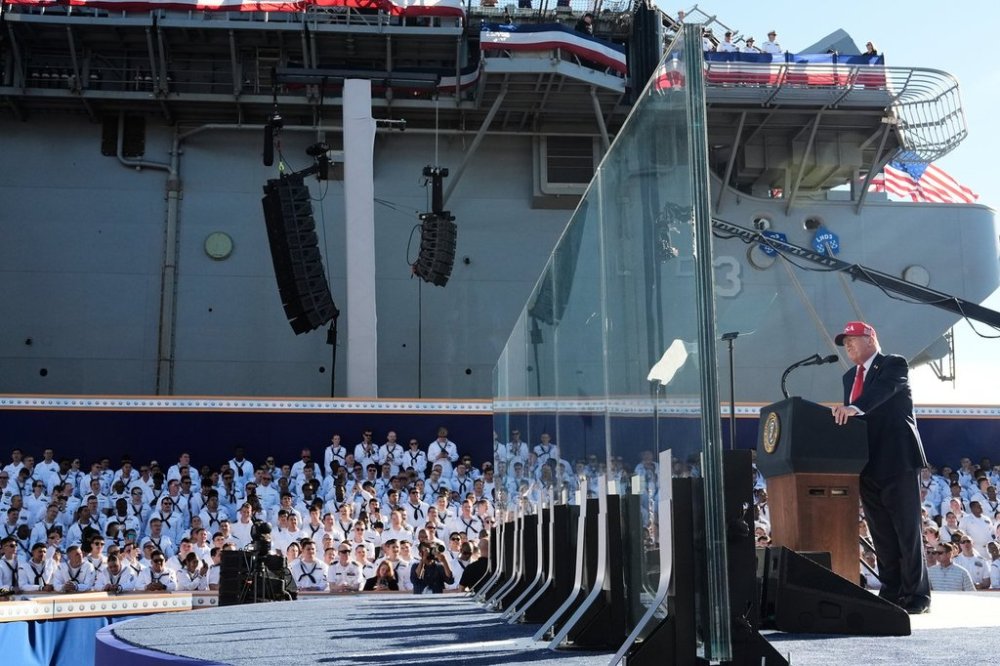Associated Press disputes Trump’s false characterization of its legal fight over access
Advertisement
Read this article for free:
or
Already have an account? Log in here »
To continue reading, please subscribe:
Monthly Digital Subscription
$1 per week for 24 weeks*
- Enjoy unlimited reading on winnipegfreepress.com
- Read the E-Edition, our digital replica newspaper
- Access News Break, our award-winning app
- Play interactive puzzles
*Billed as $4.00 plus GST every four weeks. After 24 weeks, price increases to the regular rate of $19.00 plus GST every four weeks. Offer available to new and qualified returning subscribers only. Cancel any time.
Monthly Digital Subscription
$4.75/week*
- Enjoy unlimited reading on winnipegfreepress.com
- Read the E-Edition, our digital replica newspaper
- Access News Break, our award-winning app
- Play interactive puzzles
*Billed as $19 plus GST every four weeks. Cancel any time.
To continue reading, please subscribe:
Add Free Press access to your Brandon Sun subscription for only an additional
$1 for the first 4 weeks*
*Your next subscription payment will increase by $1.00 and you will be charged $16.99 plus GST for four weeks. After four weeks, your payment will increase to $23.99 plus GST every four weeks.
Read unlimited articles for free today:
or
Already have an account? Log in here »
The Associated Press is objecting to Donald Trump’s false claims about its ongoing legal dispute over access after the president incorrectly characterized the case in a public forum — a situation that goes back to the news service’s decision last winter not to follow the president’s executive order to rename the Gulf of Mexico.
Trump, speaking Sunday on an aircraft carrier while marking the 250th anniversary of the U.S. Navy, said that “we got sued by The Associated Press and they lost.” The president said the “liberal” AP “got thrown out of court” and that “they’re almost not allowed to cover me anymore.”
In fact, the AP won its case against Trump, but the president successfully earned a delay in getting the ruling enforced before the U.S. Court of Appeals considers the issue. Arguments on the president’s appeal are scheduled for November.

“The court ruled in AP’s favor — in a strong opinion in support of free speech — and the government is appealing,” AP spokesman Patrick Maks said. “As we’ve said throughout, the press and the public have a fundamental right to speak freely without government retaliation.”
The White House began blocking AP’s access to limited-space events like Oval Office news conferences or trips on Air Force One in February. That was after the news organization, through its influential Stylebook, advised its journalists that while they could refer to Trump’s desire to rename the body of water the Gulf of America, the name has not officially changed.
The AP sued, arguing that the government was unlawfully punishing the organization for its point of view. U.S. District Judge Trevor N. McFadden, a Trump appointee, agreed that the White House — once it had decided to invite reporters — could not “shut those doors” on those reporters because of what they’ve said or written.
The Trump White House said it’s up to them to determine who gets access to the president. Absent an order to enforce the ruling, the White House has followed its own path. AP photographers are generally permitted into the limited space events, but it’s much rarer for a text reporter. Before Trump’s return to office, the White House Correspondents Association has generally decided on access and AP, as a wire service that most outlets subscribe to, was virtually always permitted.
The president has applied pressure against news organizations on several fronts, with ABC News and CBS News settling lawsuits related to their coverage. Trump has also filed lawsuits against The New York Times and Wall Street Journal. The president has also moved to choke off funding for government-run services like the Voice of America and Radio Free Europe/Radio Liberty.
The AP also disputed Trump’s characterization that the news service is not covering him as a result. Through other methods, such as video of Trump appearances in the White House, it is able to follow what the president is saying and doing.
McFadden, in his ruling, said that he didn’t seek to give AP permanent access to the limited events, “but it cannot be treated worse than its peer wire services either.”
___
David Bauder writes about media for the AP. Follow him at http://x.com/dbauder and https://bsky.app/profile/dbauder.bsky.social


